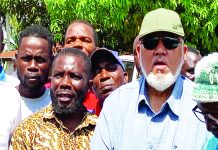Top: Women on a farm in Sarpimah, Gbarpolu County. The DayLight/Harry Browne
By Varney Kamara
MONROVIA – Stakeholders have agreed to mainstream gender equity and inclusion across the agriculture, land, and forestry sectors in Liberia.
The enforcement of gender policies across these sectors has been largely hampered by access to information, a coordinated strategy, traditional practices and norms, capacity, and budgetary constraints.
Women in Liberia make important contributions to both the agriculture and land sectors, but they continue to play limited roles in leadership structures determining the fate of these industries. They produce over half of the country’s food crops, creating 60 percent of agricultural products, and carrying out 80 percent of trading activities in rural areas, studies showed. Meeting the global food needs increasingly depends on the mainstreaming of gender issues into the agriculture and forestry sectors, and would enhance the resource capability of women, according to a World Bank report, but that has been missing.
The National Gender Policy of Liberia and the 2018 Land Rights law recognize women’s right to land ownership and demand their full participation in matters pertaining to the usage and development of these vital resources. The gender policy bars all forms of discrimination against women, while the Land Rights Act gives equal participation and access to land. Not respecting and enforcing these rights also violates the Convention on the Elimination of All Forms of Discrimination against Women (CEDAW) of which Liberia is a signatory.
“We need to create awareness on the policies because people are not even aware of the law. We need to target the custodian of traditional practices to provide information on the importance of the policy,” said James Parker, principal project manager of ProForest at a two-day gender conference in Monrovia that brought together representatives of the government, CSOs, and businesspeople. The nongovernmental organization supports governments and civil society organizations on the sustainable management of forest products and helped organize the event.
“We also need to talk to the government on how it can provide tools and budget support for implementation,” he added in an interview with The DayLight.
Liberia has attractive gender equity laws on the books which have largely failed to be implemented. A gender assessment policy in the country shows the vast disparity in land ownership between women and men. The study revealed women are to be negatively impacted by the lack of implementation of gender policies across the agriculture and forestry industries, including the environment. It underscores gender equality as a major factor affecting the value of the supply chain in the cocoa sectors and revealed how commercial logging and chainsaw mailing have been the major sources of deforestation.
“This is a serious global issue when it comes to women’s control over land,” said Wilhemina Beyan, program director of Social Entrepreneurs for Sustainable Development (SESDev). Which helped organize the event. “In order to make this work, we need to carry on more targeting of traditional leaders and chiefs, including Zoes. We need to create awareness among them and explain the importance of the role of women across these sectors.”
Participants, representing the rubber, oil palm, and forestry industries, agreed to continue building the capacity of women, as well as institutionalizing gender policies across the public and private sectors.
A special report is expected to be prepared from the outcome of the conference to seek donors’ support for specific interventions, they agreed.
“We need to increase advocacy for the protection of women’s rights in the rubber sector, ensuring that they, too, climb to big positions,” Wilhemina Siaway, president of the Rubber Planters Association of Liberia (RPAL) told The DayLight. “We’ll continue to push for equal rights, equal opportunity, and equal participation of women in the society.”
“If we want this thing to work, we must continue to rally everyone to support women’s rights across the sector. Women are an integral part of the oil palm sector, and we must never forget this,” Franklyn Jackson, head of the Association of Liberian Oil Palm Farmers Incorporated (ALOPFI) told this online news platform.





Facebook Comments